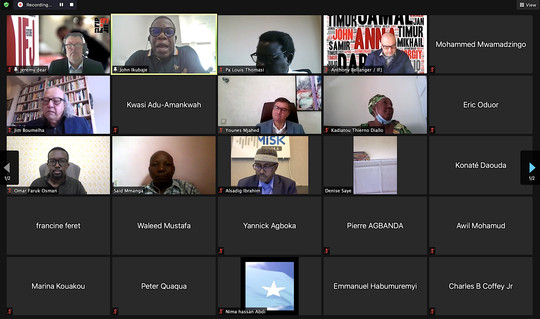The Webinar brought together leaders and representatives of journalists’ unions and associations across the continent as well as representatives from the African Union Commission (AUC), the International Labour Organisation (ILO) and African Regional Organisation of the International Trade Unions Confederation (ITUC- Africa).
In delivering the official opening address, IFJ President, Younes Mjahed, said that the COVID-19 pandemic had revealed that what the people need is professional journalism. Society, he said, particularly needs good journalists and quality journalism that will help the citizenry to get the information that they want and to engage themselves in meaningful debates. “As journalists and trade unionists, we have to work hard to protect working journalists, defend media freedoms and professionalism as well as defending and promoting democracy”.
The Senior Political Officer at the Department of Political Affairs, Peace and Security at the African Union Commission (AUC), John Ikubaje, said that the COVID-19 pandemic has impacted negatively on press freedom and the conditions of work of journalists in the world and particularly in Africa. The African Union, he emphasised, has prioritised the promotion and protection of journalists since December 2004, through the establishment of the office of the Special Rapporteur on Freedom of Expression and Access to Information. The AUC has been following very closely the situation of human rights on the continent particularly the rights of journalists and the sharing of best practices during the COVID-19 pandemic.
In a similar vein, the Africa Officer of the Bureau for Workers’ Activities at the International Labour Organisation (ILO), Dr. Mohammed Mwamadzingo, said that the working conditions of most workers are very precarious. “Journalists like other workers during the pandemic have been exposed to very long hours of work, while some of them have lost their jobs and others suffered salary reductions. Journalists’ unions must work together to protect their members from such abuses. The right to freedom of association and collective bargaining are fundamental rights and journalists’ unions must do everything possible to engage employers to protect media workers”.
The General Secretary of ITUC- Africa, Kwasi Adu-Amankwah, salutes the work of journalists during the COVID-19 pandemic noting that journalists and other media workers have to work under very strenuous circumstances in order to get the news to the people. The violations of the rights of journalists are a phenomenon that assail other workers. “These violations can only be mitigated by the roles played by trade unions through their negotiations, and this can only be possible by organising”.
IFJ Deputy General Secretary, Jeremy Dear, highlighted that the COVID-19 pandemic has shown the vital role that journalists play. It has also demonstrated the precarious state in which many journalists and independent media exist. The private media have seen a catastrophic collapse in advertising revenue –– meaning titles and stations have closed, online media have collapsed, pagination has been cut and staffing has been drastically reduced. The impact is less scrutiny, less investigative journalism. Despite these huge challenges slammed on the media by COVID-19, many governments have used the crisis to bring in new laws – claiming to tackle fake news – but in reality, being used to silence critical and investigative journalism. As a result, journalists have been "jailed, arrested, prevented from accessing information and citizens are denied their rights to information".
FAJ President Sadiq Ibrahim Ahmed said “Despite the difficulties and vulnerabilities being experienced by journalists during the pandemic in almost every country in Africa, journalists are hoping for a brighter future and fighting the battle of quality and safe journalism through their unions. FAJ pledges to amplify their voice and stand together with their struggles.”
“COVID-19 is a natural disaster, but how African governments are responding is a product of their politics. The IFJ is committed to work strategically with other global union federations like the ITUC to support journalist unions’ efforts to build unity and solidarity and resist the attacks on journalists’ rights together at the national, regional and continental levels” said Anthony Bellanger, IFJ General Secretary.
High-quality interventions were made by journalist union leaders who highlighted that the journalist unions across the continent fought tooth and nail to defend media rights since the pandemic started, and voiced the need for stronger union actions in protecting working conditions, and safe and healthy workplaces for journalists and workers. They have emphasized the importance of journalist solidarity to protect employment conditions and rights at this time.
In concluding, Bellanger acknowledged “the rich discussion in this webinar has brought many inspiring examples of our unions campaigning and negotiating to confront the virus together to protect journalists and journalism. We move forward more ready to progress our concerted efforts despite the restrictions.”
The Webinar, while revisiting the FAJ Survey on “The Impact of COVID 19 and the Unions: What Future for Journalism” also deliberated on numerous crucial themes that currently posed huge challenges to the media, namely, COVID19 and Media Freedom: A new Frontier for violating journalists’ and Trade Union Rights, and Uncovering Misinformation and Fighting Disinformation: What Role for Journalists and their Unions? and Enhancing Media Sustainability in the face of COVID-19.

